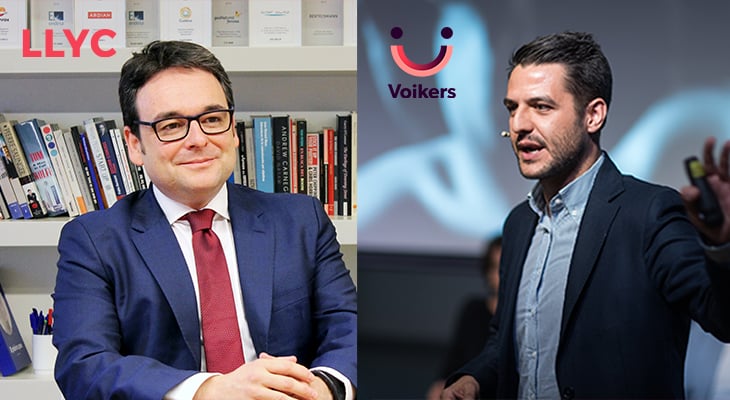
-
TrendsPublications and Reports
-
CountriesSpain
In 2023, the Spanish higher education sector is registering an unprecedented level of competitiveness in student recruitment. The digital transformation, the demographic challenge, the operational growth of academic institutions, geo-economic uncertainty, among other aspects, mark the motivations of students in their process of choosing a university, graduate school or business school. In this context, the degree of specialization offered (linked to the atomization of the labor market), the price of the program and the format (online, classroom or hybrid) in which the training is given are the three most relevant aspects when selecting a center for future students in Spain, according to the report ‘Communicating in the midst of the educational revolution’ prepared by the experts in Corporate Communication of LLYC Madrid within the framework of Education Week.
The report, promoted by the leading communications, marketing and public affairs consultancy in Spain and Latin America, is based on an analysis of quantitative and qualitative data. The document addresses the main keys for schools to connect in a differential way with Spanish students. “In the past, the professionals in charge of higher education institutions were mainly concerned with reputation management, reinforcing drivers such as academic and research excellence. While it is true that this requirement has not disappeared, today the number of levers that universities must activate to win the reputation battle has multiplied exponentially,” explained Anne Corcuera, Director of Corporate Communications at LLYC.
Motivational differences between undergraduate and graduate students: reputation vs. price and format
The report shows significant differences in the interests of undergraduate and postgraduate students: according to the Internet search data analyzed, when it comes to undergraduate studies, the positioning of the university where the training is given is twice as important as when it comes to postgraduate studies. In this context, the experts point to the influence of the family and tutors (as the main prescribers in the choice); as well as to the absence of academic and professional vocation (since, in this period, students are more uncertain about their future and see the reputation of the educational center as a highly positive and differential factor).
This uncertainty, however, is greatly reduced in the context of graduate studies. For Spanish students or postgraduate or master’s programs are conceived as “vocational levers” or as “keys to the professional career of their dreams”. Specifically, Spanish students’ perception of master’s degrees is so idyllic that Spain is the country that is most interested in the expression ‘university master’s degree’: 43% of global searches for this keyword in search engines come from our country.
Likewise, within the main motivations of postgraduate students, Internet searches for terms such as ‘scholarships’, ‘prices’ and ‘online’ are associated with postgraduate degrees; each of these keywords generate approximately 100% more searches. While the first two search terms refer to the financial section, the third focuses on the modality of these studies. In addition, when analyzing the topics of the most searched online questions related to undergraduate and graduate studies, cost and grants appear with more recurrence. In contrast, undergraduate students are 93% less interested in scholarships and 97% less interested in tuition fees than master’s students because they do not have to combine, at least in the first few years, with full-time employment.
Hyperspecialization, employability or geographical scope: essential levers when choosing a training center
Communicating in the midst of the educational revolution’ also delves into the analysis of the most decisive factors for students when deciding on the studies they are going to pursue. In this context, hyper-specialization in education is one of the main criteria (since, according to the report, students perceive how this contributes to a differentiation of their profile, which would multiply their chances of entering the labor market). Likewise, they positively assimilate this hypersegmentation as a quality of the center when adapting to a constantly changing world where new disruptive elements arise, always closely linked to the professional field (from the birth of the metaverse to the incorporation of AI). In fact, Spanish students reflect a deep concern for the employability potential of their studies (where the most credible prescribers play a decisive role: the Alumni network of each institution).
The human capital of an educational institution is another of the essential levers, where the academic quorum is an indispensable factor. In this context, young people demand “quality” from these profiles and, above all, a balance between professionals with “field” experience and “teachers who have been in the field” and with an academic background.
Additionally, in the specific case of pre-university students, location is one of the elements mentioned. In this sense, the universities of Catalonia and Madrid are the best positioned in search engines, since, among the first 20 centers that appear, 29% of the cases are Catalan institutions and 20% are Madrid centers. But it is not only the geographical element that is valued: students are also concerned about accessibility (the center’s ability to provide students with an adequate timetable to combine classes with breaks, study and leisure time).
Among other elements, the report also points out the relevance that Spanish students give to factors such as international reputation, the possibility of enjoying innovative spaces with available technology, the emotional connection and the sense of belonging that the educational center has the possibility of generating.
The complete study can be downloaded by clicking here.


